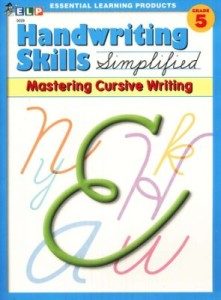Fifth Grade Language Arts
We have taken all the guesswork out of Language Arts and simply offer lesson plans that are effective, efficient and fun. Our CGA program provides activities families can do together along with specific grade-level appropriate material that cover all the academic needs. This program is the easiest to follow because each weekly lesson is provided and sequences weekly for parents to follow. Additionally, the power standards checkpoints are provided throughout the year. So you can easily upload the submissions into Ally and check that your child is competent.
Family Literacy and Skills Curriculum Map by Grade Level
Week 1: Homepage with Links to the First Lesson for grades K-3.
Explanation of the Family Literacy and Skills Program.
Each week, there will be three days of skill practice in order to:
Family literacy is available for all grades and reading levels placing an importance on phoneme awareness, phonics and decoding, but then going beyond with syntax, morphology, and semantics. Reading needs a brand new circuit of knowledge and the Family Skills Literacy program can change the thinking through a print and digital adaptive, blended instruction. Each week they will connect the world around them to their own experiences through fluent cognitive awareness.
Family Literacy expands vocabulary by exposing the students to new words and ways they can sound out and find the meaning of words through the science of reading, by increasing their ability to expand their vocabulary, spelling, grammar skills and helping the student be a part of this entire comprehension, systemic approach to literacy.
Family Literacy sharpens the mind through being a part of the entire comprehension and engaging the students’ brains tapping into their critical analysis and empathy to help make judgments and focusing on the importance of messages in a single word and simple phrases so by the end of the year students will have an automatic, fluent, comprehending brain.
Reading and writing are great entertainment and have to be part of this entire comprehensive process. Family Literacy will allow your student to travel to a new world each week connecting their thoughts and feelings. Reading is not only about uncovering new discoveries, but a vehicle to challenge and reflect.
We have the absolute best academic support for early learning, engagement, and mastery. CGA family literacy helps build a sense of self understanding and facilitates evaluation of individual needs. The more a student knows about a word, the quicker the student will read and comprehend words and stories.
Humanities classes are designed to stimulate thinking and to help develop strong writing skills for the students. Based on student interaction and engagement, these courses will strengthen deeper reading skills, critical thinking, productive collaboration, accountability, and encourage follow-through.
Essentials curriculum uses proven, research-based methods to teach remedial students ages 8 to adult to read, spell, and write successfully. Essentials improves the spelling and reading skills of all learners by providing linguistically accurate phonics instruction, fluency practice, morphology and vocabulary development, grammar, and composition. Clear instructions and scripted lessons allow teachers, tutors, and parents to learn alongside their students, developing their own understanding of the structure of English as they teach. Multi-sensory instruction and a variety of multi-sensory exercises allow teachers to customize the curriculum for the needs of their students, paving the way to success in reading for all kinds of learners. Learn More
Comes with: Essentials Teacher’s Guide, Essentials Student Workbooks, Spelling Journal, Basic Phonogram Flash Cards, Spelling Rule Flash Cards, Advanced Phonogram Flash Cards, Grammar Flash Cards, Phonogram Game Cards (2 sets in different colors), Phonogram Game Tiles, Phonogram and Spelling Rule Quick Reference, Spelling Analysis Card.
Notes: Logic of English is a very solid phonics foundation that will start at square one and progress very quickly. It is meant for remediation students above age 8. It is quite parent intensive but may raise reading level significantly. Placement
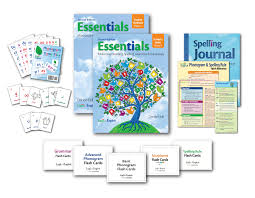
This program is highly structured. Lessons are taught with continual teacher-student interaction. Students then complete worksheets or writing assignments from their workbooks. CD’s present jingles and the question and answer flow for different types of sentences. The teacher’s manual explains the methodology and offers useful teaching tips and some creative ideas. Learn More
Notes: Because the methodology and concepts are repeated from year to year. You can begin to use this program at any level—you need not go back to level 1.
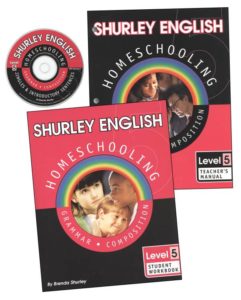
Blast into the solar system and explore the depths of the ocean. Follow American History from the first colonies to westward expansion, to the lives of the immigrants. Learn about the 50 states and research the history of your own state. Explore the amazing human body. Read about the lives of inventors and try your hand at your own invention. The Age 9-11 curriculum covers the standards in science, social studies, and language arts. The literature units can be bought independently from the science and social studies units. This provides you with the option of utilizing Moving Beyond the Page as an independent language arts program or as a science / social studies program to supplement your current curriculum. There are a total of 12 literature units that accompany the Age 9-11 level. They are each designed to accompany one of the 12 science / social studies units that make up the year-long curriculum package. All units are broken down into daily lesson plans. When you begin lesson 1 of a science / social studies unit, you will also begin the first day of the corresponding literature unit. The knowledge gained in each science and social studies unit is reinforced through the corresponding literature unit. Learn More
Comes with: Each Concept comes with a variety of Literature, Manipulatives, a Teachers Manual and Student Activity book.
Notes: Moving Beyond The Page is a literature based curriculum. It does become overwhelming with so many activities. Our favorite way to use it is to pick and choose between activities and not become bogged down by doing all of them. Placement Test
Makes learning to read interesting and engaging for kids, with great online reading games and activities. Children love the games, songs, golden eggs and other rewards which, along with feeling proud of their reading, really motivate children to keep exploring and learning. Learn More
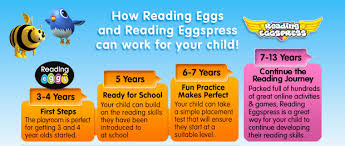
Because it is delivered over the Internet, Reading A-Z is a constantly changing program. Each month, Reading A-Z adds new books, lesson plans, and other resources, thus continually expanding its wealth of materials. Learn More
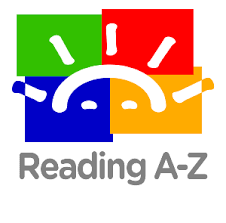
In Ancient Achievements, students will read about fascinating topics from long ago, such as cave paintings, Viking ships, and Marco Polo. This is the last level in the skill development stage of spelling. It provides continued word practice using the three core activities of chunking, copy work, and dictation while gradually increasing the reading level. At the same time, a new Spotlight feature introduces students to interesting facts about words. The Instructor’s Handbook offers optional activities to help prepare students for the next two stages of spelling. Learn More
Needs: Instructors Handbook and Student Pack.
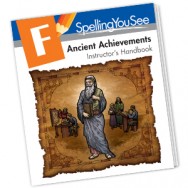
Each lesson within the Level 5 spelling and vocabulary program contains 14 list words. List words are progressively more difficult than those used in prior levels. Multi-syllable words and more complex words are common in this level. Lessons contain games such as deciphering puzzles, word jumbles, crossword puzzles, word search, definition matching, unscrambling words, identifying misspelled list words in a paragraph or sentence, alphabetizing word groups, and complete the sentences. Learn More
Comes with: Workbook and Answer Key.
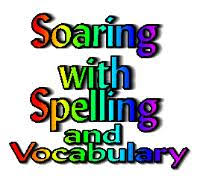
In Level 4, your student will continue to learn encoding skills, reliable spelling rules, and multisensory strategies for spelling, along with exciting new concepts including 12 new phonograms, prefixes, strategies for multisyllabic words, abbreviations, and words with unaccented A. Phonological awareness and encoding skills are taught throughout Level 4. Learn More
Needs: Teachers Manual, Student Pack and Interactive Kit (If you are using this curriculum with All About Reading the Interactive Kit is the same so you only need one).
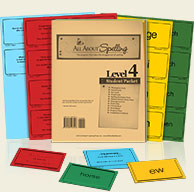
Spelling Workout has all the components you need to lead students from simple sound-letter relationships to more complex spelling patterns. Students learn spelling skills based on phonics through unique, cross-curricular reading passages, practice, and high-interest writing activities. Packed with flexible lessons, motivating activities, including fun riddles and puzzles, this dynamic program leads students to spelling success! Learn More
Notes: My personal favorite Spelling program as it is phonics based and includes writing and editing.
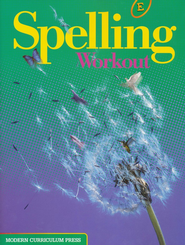
Susan Wise Bauer wrote the Writing with Skill for students to begin to work through independently, and the text is written directly to the student. Organized by days, each “step” progressively moves students through the workbook as they move from one day to the next. Covering the basics of composition, outlining, sentence skills, beginning literary criticism of poetry and prose, writing narratives and descriptions, and researching and documenting sources, the course culminates with a final project. Using extensive literary models and step-by-step instructions on the lesson concepts, students will gain the tools needed to write with clarity and confidence. All source material is included; students will need to write their assignments in a separate book. Grade 5-8. Learn More
This teacher’s edition accompanies the sold-separately Writing with Skill Student Workbook, Level 1. While the Writing with Skill program is designed for students to begin to work through on their own, this teacher’s guide is easily structured for parents to help their students when necessary. Broken up by week, elements that students are to complete independently are clearly noted “Student Responsibility;” portions without the note may require help to complete or check the assignment and often have the heading “How to help the student with step (x).” Student instructions for all sections are included and are listed by day in bold print that makes it easy to find your place. Within each week’s lesson, assessment rubrics, answers, explanations of more difficult concepts, and discussion questions are provided for a complete guide to teaching writing. 580 pages, softcover.
Needs: Instructor Text and Student Workbook.
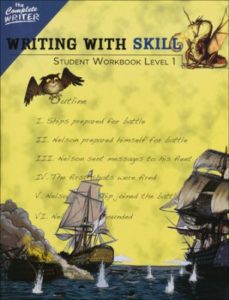
Grades 4 – 6 Teach writing skills using this innovative new approach. The Four Square method can be used with all forms of writing and will fit any reading or language arts program. This step-by-step approach is built around a simple graphic organizer that first shows students how to collect ideas and then helps them use those ideas to create clear and polished prose. Open-ended reproducibles make the technique accessible to writers of all ability ranges. Learn More
Notes: A writing method that is easy to teach.
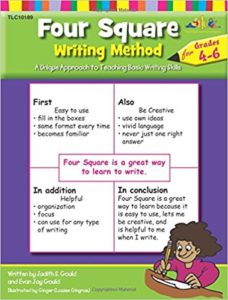
This level covers direct, indirect quotations, dialogue, the writing process, creative writing, personal narrative, descriptive writing, persuasive writing, informational writing, compare and contrast writing, and explanatory writing, among other things. Learn More
Comes with: 2 Workbooks and Answer Key.
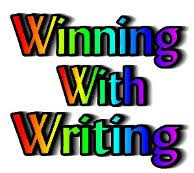
Grades 3-5 Recorded live with Mr. Andrew Pudewa, this four-DVD writing course for elementary students new to IEW lays a solid foundation of writing skills. Over the course of 15–30 weeks, students will learn how to effectively use a wide range of structural models and stylistic techniques in their compositions, as they write on a variety of enjoyable fiction and non-fiction topics. Included with the student handouts are complete teacher’s notes, source texts, assignments, and checklists. Learn More
Comes with: Student Notebook and Instructional DVDs.
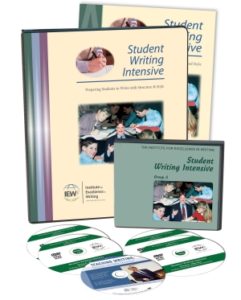
The most overlooked stage in the writing journey!
Do you wonder how much support to give to your child’s writing? Are you worried that you might be helping too much, or that your child won’t become an independent writer if you help your child write, revise, and edit his or her work? You’re not alone. The truth is: educational development in children grows in direct proportion to the appropriate level of support offered by a caring experienced adult. You are that person!
Successfully navigate the Partnership Writing phase (no more “blank page, blank stare” syndrome!) with our Year-Long Language Arts Plan and 10 Monthly Writing Projects. Parents are given clear instructions about how much support to give to a child’s writing project—what’s too much, what’s not enough? You’ll go on a journey of joyful collaboration with your child, who will gain confidence and excitement about writing.
The Partnership Writing program product:
Partnership Writing helps you create a language-rich environment, suggests a daily routine for your language arts practices, and provides you 10 month-long writing projects/assignments (the “what to write”) to last all year. Learn More
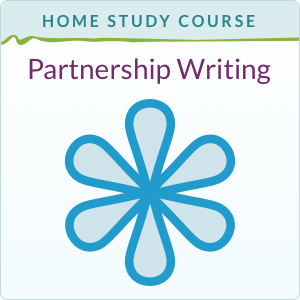
Simple subjects and complete subjects, simple predicates and complete predicates, diagramming compound subjects and predicates, avoiding run-ons, divided quotations, outlining, advanced capitalization, appositive nouns, multiple direct objects, predicate nouns, subject-verb agreement with more than one subject, confusing verbs, the antecedent, subject and object pronouns, reflexive pronouns, demonstrative pronouns, indefinite pronouns, interrogative pronouns, indefinite pronouns, interrogative pronouns, compound words, proper and predicate adjectives, using apostrophes, degrees of adverbs. Learn More
Comes with: Workbook and Answer Key.
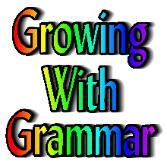
Level 1 (Grade 4-5) Improves students’ grammar, punctuation, spelling, capitalization, and attention to detail using a standards-based thinking approach rather than drill and practice. This effective method teaches students to carefully analyze and edit stories. This book includes 16 lessons in grammar and mechanics. Students identify and circle errors in each story and write their correction. The grammatical and mechanical errors in the paragraphs are based on general instructional guidelines for specific grade levels; the content level, however, is ungraded, allowing usage of these materials at many instructional levels. Writing styles and content are varied to sustain interest and to broaden the students’ exposure to different writing formats, such as letters, stories, and dialogue. The illustrations integrated into the context of the activities further spark student interest. The skills developed can be applied to the students’ own writing. Detailed answers are also included. Learn More
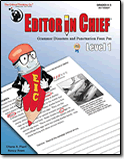
Level A1 (Grade 5-6) The standards-based critical thinking activities of Reading Detective® develop the analysis, synthesis, and vocabulary skills students need for exceptional reading comprehension. The activities are especially effective at helping students understand more challenging reading concepts such as drawing inferences, making conclusions, determining cause-and-effect, and using context clues to define vocabulary.Students read and analyze short literature passages and stories that include fiction and nonfiction genres. Then they answer multiple-choice and short-response questions, citing sentence evidence to support their answers. Learn More
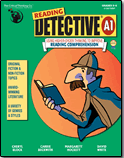
Level A1 (Grade 5-6) Science Detective® uses topics and skills drawn from national science standards to prepare students for more advanced science courses and new assessments that measure reasoning, reading comprehension, and writing in science. First, students read lessons that include a variety of charts, tables, and graphs. Then, they answer critical thinking questions to improve their understanding of the science concepts and develop their reading comprehension, and inferential and deductive thinking skills. Students can’t just scan the story for answers—they must carefully analyze and synthesize the information from the text and the charts, tables, and graphs to explain and support their answers. Learn More
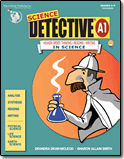
Level 1 (Grade 5-12) Students learn the meaning and spelling of roots, prefixes, and suffixes commonly used in English. Learning these word elements dramatically improves spelling and the ability to decode unfamiliar words. The activities focus on using these words in context to help students incorporate each word into their vocabulary and retain the correct spelling. There are periodic reviews to make sure students retain what is taught in the lessons. Word Roots books will add hundreds of words to your students’ vocabulary and greater depth to their thinking. Learn More
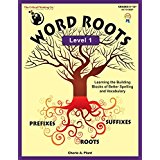
(Grades 4-7) The Language Mechanic is a comprehensive program that uses fun examples and logical reasons to eliminate the confusion students often feel while learning the mechanics of language. This book demonstrates and reinforces why each language rule is important. Lessons begin with a “grabber”—a humorous miscommunication that results when a rule is broken. Examples are followed by an explanation of the specific rule, the logic behind it, then guided and independent practice. Learn More
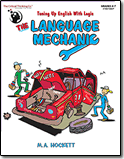
Zaner-Bloser Handwriting is a complete handwriting program that can be taught in as little as 15 minutes a day! The Zaner-Bloser style teaches a cursive alphabet that is made up of four basic strokes: the undercurve, downcurve, overcurve, and slant.
This fifth-grade cursive workbook focuses on manuscript maintenance and mastery of cursive. Colorful and engaging exercises include tracing and writing letters, joinings, words, sentences, and longer passages. Review and application exercises are included throughout. Shape, size, spacing, and slant are emphasized as the keys to legibility. The last unit is “using what you have learned” and focuses on real-life applications of cursive handwriting such as writing notes, writing an outline, writing a list, writing a poem, and more. Learn More
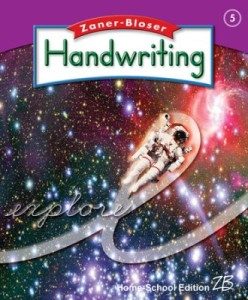
D’Nealian Handwriting is the original continuous stroke handwriting program! It’s based on a few simple connecting strokes that children use to write in cursive.
Three units are included in this Grade 4 workbook: Reviewing Manuscript Letters, Writing Cursive Letters and Applying Handwriting Skills. Students will practice writing capital and lowercase letters (paying particular attention to the finer details of each letter’s strokes), copy the provided letters/words/sentences provided, practice correct spacing, and finish assignments based on real-life situations. Learn More
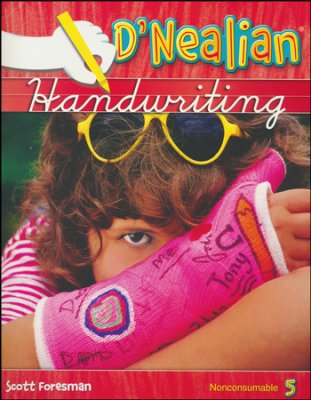
Mastering Cursive Writing, Level E guides in the development of legible handwriting and provides opportunities for practice. Learn More
